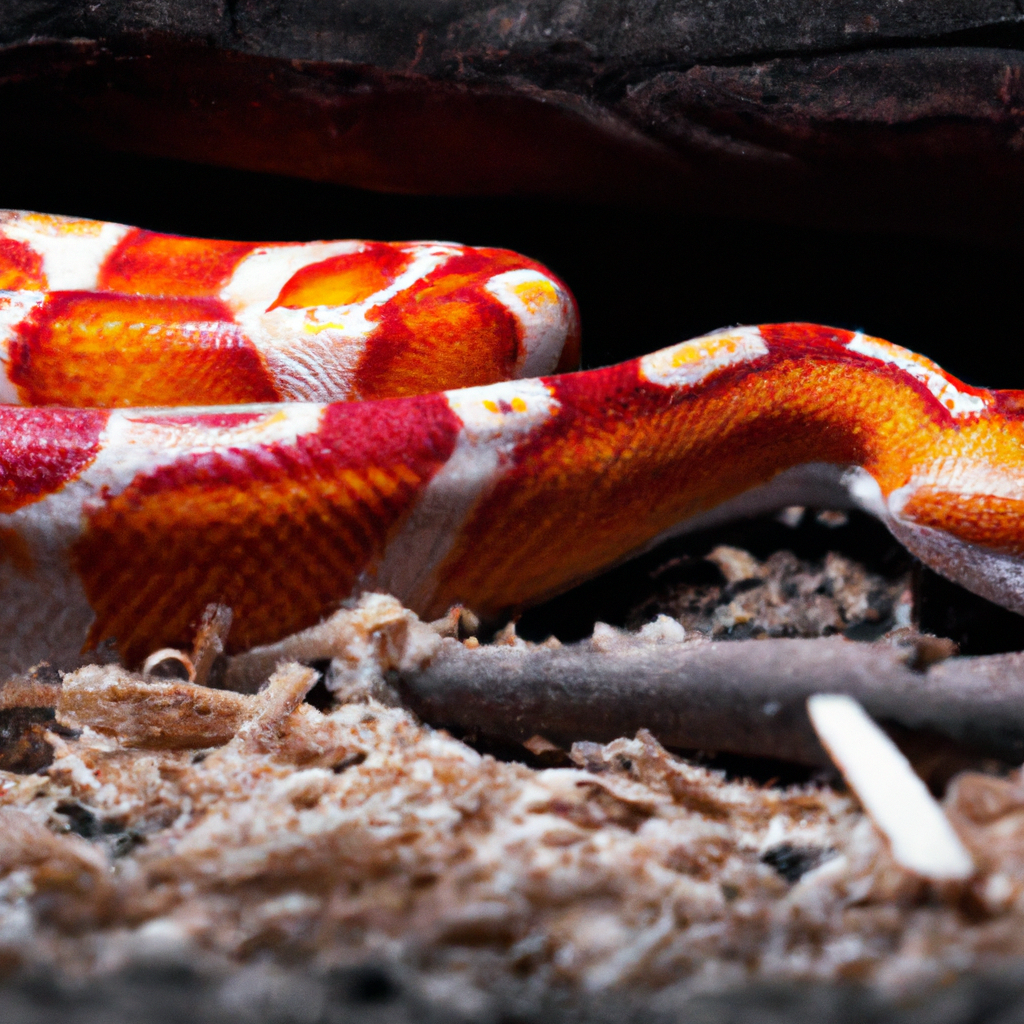If you’re a reptile owner, you know the importance of providing your scaly friend with a well-balanced diet. And what better way to ensure they receive the nutrients they need than by feeding them live prey? Crías De Roedores Para Reptiles offers a wide variety of small rodents, carefully bred and raised for reptilian consumption. These healthy and nutritious meals are not only delicious for your reptile but also mimic their natural hunting instincts. Say goodbye to the hassle of sourcing food for your reptile, and give them the best meal possible with Crías De Roedores Para Reptiles.

Introduction
Welcome to the wonderful world of rodent offspring! If you have a reptile as a pet, you may find yourself in need of small, healthy rodents to feed your scaly friend. In this comprehensive guide, we will explore different types of rodent offspring available, how to choose the right ones, proper feeding techniques, housing requirements, health and safety considerations, breeding tips, general care for rodents, where to find them, and important ethical considerations. So, let’s dive in and make sure both your reptile and its food are happy and well taken care of!
Types of Rodent Offspring
Mice
Mice are a popular choice when it comes to feeding reptiles. They are small, easy to handle, and provide a decent nutritional profile. There are different mouse varieties to choose from, including pinky mice for newly hatched reptiles, fuzzy mice for growing reptiles, and adult mice for larger reptiles. Mice have a high reproductive rate, making them readily available as rodent offspring for reptiles.
Rats
Rats are another common option for reptile owners. They provide a larger meal option, which is ideal for bigger reptiles or those with a hearty appetite. Rats come in different sizes, such as rat pups for smaller reptiles and adults for larger ones. When choosing rats as rodent offspring, it is important to consider the size of your reptile’s enclosure and its specific nutritional needs.
Hamsters
Hamsters are not typically the go-to choice for reptile owners, but they can be suitable for certain reptile species. Syrian hamsters, also known as golden hamsters, are the most common variety. However, it’s important to note that hamsters have different dietary requirements compared to other rodents. Before using hamsters as rodent offspring, ensure that their nutritional needs align with your reptile’s requirements.
Gerbils
Gerbils are small and nimble rodents that can make excellent food options for reptiles. They are generally gentle and easy to handle, making them suitable for reptile owners who prefer a slightly more challenging prey item. Like other rodent offspring, gerbils also come in various sizes depending on the age and nutritional needs of your reptile.
Guinea Pigs
Guinea pigs may not typically be considered as rodent offspring for reptiles, but they can still be an option for certain reptile species. Guinea pigs are larger than other rodents on this list and are rich in nutrients. Due to their size, it’s important to make sure they are an appropriate choice for your reptile’s digestive system and enclosure size. Guinea pigs are also known for their social nature, so consider this when deciding if they are the right option for your reptile’s feeding needs.
Choosing the Right Rodent Offspring
When selecting rodent offspring for your reptile, there are a few key factors to consider to ensure their health and well-being.
Reptile’s Size and Age
The size and age of your reptile are crucial considerations. Smaller or younger reptiles will require smaller prey items, such as pinky mice or rat pups. As your reptile grows, you can gradually increase the size of the rodent offspring to match its developing dietary needs. It’s important not to offer prey items that are too large for your reptile, as it can lead to choking or digestive issues.
Rodent Size and Age
Choosing the right size and age of rodent offspring is equally important. For small reptiles, such as hatchlings or juveniles, opt for younger mice or rats. As your reptile matures, you can introduce larger prey items to match its increasing appetite. It’s crucial to strike a balance, providing adequate nutrition while considering the size of your reptile’s mouth and digestive system.
Nutritional Needs
Rodent offspring serve as a vital source of nutrition for reptiles. It is essential to ensure that the chosen rodent species meets the dietary requirements of your reptile. Each reptile species may have specific nutritional needs, such as a higher protein intake or certain vitamin requirements. Consult with a reptile veterinarian or a knowledgeable exotic pet store to determine the appropriate rodent offspring that aligns with your reptile’s nutritional needs.
Health Considerations
When selecting rodent offspring, prioritize their health and well-being. Look for healthy specimens that are active, alert, and free from any signs of illness or injury. Avoid rodents that appear weak, lethargic, or have obvious wounds. Choosing healthy rodent offspring increases the chances of providing your reptile with a nutritious meal and reduces the risk of introducing diseases or parasites.
Feeding Rodent Offspring to Reptiles
Proper feeding practices ensure the well-being of both your rodent offspring and your reptile. Here are some important factors to consider when feeding rodent offspring to reptiles.
Live Prey vs Pre-killed
The choice between live prey and pre-killed rodent offspring is a matter of personal preference and the reptile’s feeding behavior. Some reptiles prefer the challenge of hunting live prey, while others may readily consume pre-killed rodents. It’s important to note that there are risks associated with feeding live prey, such as the rodent causing harm to the reptile. If opting for live prey, always supervise the feeding to ensure the safety of both your reptile and the rodent offspring.
Feeding Frequency
The feeding frequency of rodent offspring will depend on your reptile’s age, species, and individual appetite. Younger reptiles generally require more frequent feedings, while adult reptiles may only need to eat every few days or even weeks. Follow the recommended feeding guidelines for your specific reptile to avoid over or underfeeding.
Proper Sizing
It is crucial to offer appropriately sized rodent offspring to your reptile. As mentioned earlier, you should select prey items that are suitable for your reptile’s size and age. The size of the prey should match the girth of your reptile’s widest part of the body. Feeding prey that is too large can lead to digestive issues or choking hazards.
Variety in Diet
To mimic the variety found in the natural diets of reptiles, consider offering a diverse range of rodent offspring. Just as in the wild, reptiles benefit from a varied diet that includes different types of rodents. This enhances their nutritional intake and can help prevent dietary deficiencies. Always ensure that the chosen rodent species aligns with your reptile’s nutritional needs and consult with a reptile specialist if you are unsure.

Housing Rodent Offspring
The housing and environment provided for rodent offspring are important for their well-being before they become reptile food. Proper housing ensures their health, comfort, and safety. Here are some key considerations when housing rodent offspring.
Individual Enclosures
Proper housing for rodent offspring involves providing suitable enclosures for each individual. Avoid overcrowding the rodents to prevent stress, aggression, and the spread of diseases. Individual enclosures allow you to closely monitor the health and behavior of each rodent, ensuring that they are in optimal condition before becoming reptile food.
Substrate
Choose safe and appropriate bedding or substrate for rodent offspring enclosures. Aspen shavings, paper-based bedding, or other materials specifically designed for small rodents are commonly used. Avoid pine or cedar shavings, as the fumes emitted can be harmful to the rodents.
Temperature and Humidity
Maintaining appropriate temperature and humidity levels is crucial for the health and well-being of rodent offspring. Avoid exposing them to extreme temperatures or fluctuations, as they can be sensitive to such changes. Provide a warm and comfortable environment with a temperature range suitable for the specific rodent species you are housing.
Hiding Spots
Rodent offspring, like their wild counterparts, appreciate having hiding spots in their enclosures. These can be in the form of small shelters, tunnels, or boxes. Hiding spots not only provide a sense of security but also help to alleviate stress and support their natural instincts.
Health and Safety of Rodent Offspring
The health and safety of rodent offspring should be a top priority for anyone who keeps or breeds them. Here are some important considerations to ensure the well-being of these small animals.
Regular Check-ups
Schedule regular veterinary check-ups for your rodent offspring to monitor their health. Routine examinations can help detect potential illnesses or diseases early on and prevent them from spreading to other rodents or your reptiles. Consult with a veterinarian experienced in small mammal care to ensure their specific health needs are met.
Quarantine Process
Before introducing new rodent offspring to your existing population or your reptile’s enclosure, it is essential to implement a quarantine process. Quarantine helps prevent the spread of diseases and parasites between animals. Keep the newly acquired rodents separate from the main population for a specific period of time, monitor their health closely, and consult with a veterinarian for additional guidance.
Disease Prevention
Maintaining a clean and hygienic environment is crucial for the prevention of diseases in rodent offspring. Clean their enclosures regularly, provide fresh water and appropriate nutrition, and practice good hygiene when handling the rodents. Also, avoid cross-contamination by using separate tools, such as feeding tongs, for rodents and reptiles.
Safe Handling Practices
When handling rodent offspring, it is essential to use proper techniques to ensure their safety and well-being. Always approach them gently and with care to avoid causing stress or injury. Avoid grabbing them by the tail, as this can cause harm. Instead, support their body with both hands, allowing them to feel secure during handling.

Breeding Rodent Offspring
If you are interested in breeding rodent offspring, it is important to consider several factors to ensure their overall health and success. Here are some key considerations for breeding rodents.
Proper Nutrition and Environment
Breeding rodents require a balanced and nutritious diet to ensure reproductive health. Consult with a veterinarian or a specialist breeder to determine the appropriate diet and environmental conditions necessary for successful breeding. Providing a comfortable and stress-free environment is essential for successful mating and healthy offspring.
Selective Breeding
Selective breeding involves carefully choosing which rodents to breed based on specific traits or qualities. This helps maintain desirable characteristics within the rodent offspring population. It is important to research genetic factors and consult with experienced breeders to ensure ethical and responsible breeding practices.
Breeding Challenges
Breeding rodent offspring can come with its own set of challenges. It is essential to be prepared for any potential complications or difficulties that may arise during the breeding process. These can include infertility, birthing complications, or the need for additional care for pregnant or nursing rodents. Consulting with experienced breeders or veterinarians knowledgeable in rodent breeding can help you navigate these challenges.
Caring for Pregnant Rodents
Proper care for pregnant rodents is crucial for the well-being of both the mother and her offspring. Provide a quiet and comfortable enclosure for pregnant rodents, with appropriate nesting materials available. Monitor their health closely, ensure their nutritional needs are met, and consult with a veterinarian for additional guidance on caring for pregnant rodents.
Caring for Rodents
Whether you have rodent offspring for feeding your reptile or as pets, their general care is important to ensure their well-being. Here are some key considerations for caring for rodents.
Appropriate Housing
Ensure your rodent offspring or pet rodents have suitable enclosures that meet their specific needs. Provide adequate space for movement, environmental enrichment, and a comfortable resting area. Regularly clean their enclosures to maintain a hygienic environment.
Nutritious Diet
Feeding a nutritious and balanced diet is essential for the health and vitality of rodents. Consult with a veterinarian or a knowledgeable pet store to determine the appropriate diet for your specific rodent species. Offer a variety of fresh fruits, vegetables, and high-quality rodent pellets to ensure they receive all the necessary nutrients.
Hygiene and Cleanliness
Maintaining proper hygiene and cleanliness is crucial for rodent health. Regularly clean their enclosures, water bowls, and feeding areas to prevent the buildup of bacteria or vermin. Use safe cleaning products and avoid harsh chemicals that can be harmful to rodents.
Environmental Enrichment
Rodents are intelligent and curious creatures that benefit from environmental enrichment. Provide them with toys, climbing structures, or tunnels to stimulate their minds and bodies. Regularly rotate and introduce new enrichment items to prevent boredom and encourage natural behaviors.

Rodent Offspring Availability
When it comes to sourcing rodent offspring for your reptile’s dietary needs, there are several options available. Here are some common sources to consider:
Pet Stores
Many pet stores stock a range of rodent offspring for reptile owners. Ensure that the pet store follows ethical breeding practices and that the rodent offspring are well-cared for before purchasing.
Rodent Breeder
Working with a reputable rodent breeder is another option. Breeders often prioritize the health and well-being of their animals, and they may be able to provide specific rodent offspring that meet your reptile’s nutritional needs.
Online Platforms
Various online platforms offer rodent offspring for reptile owners. Exercise caution when purchasing online and thoroughly research the seller’s reputation and adherence to ethical practices. Virtual communication allows you to inquire about the conditions and health of the rodent offspring before making a purchase.
Rescue Organizations
Some rodent rescue organizations may have rodent offspring available for adoption. Adopting from a rescue organization not only provides a home to a rodent in need but also supports a worthy cause. Ensure that the rescue organization follows responsible breeding and care practices.
Ethical Considerations
When it comes to feeding rodents to reptiles or keeping them as pets, there are important ethical considerations. Understanding and practicing ethical behavior ensures the well-being of all animals involved. Let’s explore some of these considerations.
Controversies Surrounding Feeding Live Prey
The practice of feeding live prey to reptiles can be a controversial topic. It is important to weigh the ethical implications and decide what is best for your reptile. If you choose to feed live prey, ensure that it is done responsibly and with the reptile’s safety in mind.
Responsible Breeding Practices
If you are involved in breeding rodent offspring, it is crucial to follow responsible breeding practices. This includes providing proper care and living conditions for the rodents, avoiding overbreeding, and breeding for health and genetic diversity rather than solely for profit.
Avoiding Overpopulation
Breeding rodents can quickly result in overpopulation if not managed carefully. Ensure that you have appropriate outlets for the offspring you produce or work with experienced breeders who can guide you in finding suitable homes for them.
Animal Welfare Laws
Familiarize yourself with animal welfare laws and regulations in your area. Complying with these laws ensures that the rodents, reptiles, and all animals involved are treated humanely and protected from harm.
In conclusion, caring for rodent offspring is an important responsibility for reptile owners. By choosing the right rodent species, providing appropriate housing, ensuring optimal nutrition, and prioritizing the health and safety of the rodents, you can contribute to the well-being of both the small animals and your reptile. Remember to consider ethical considerations, such as responsible breeding practices and the welfare of all animals involved. With proper care, your reptile will thrive, and the rodent offspring will provide a valuable source of nutrition for your scaly friend.

